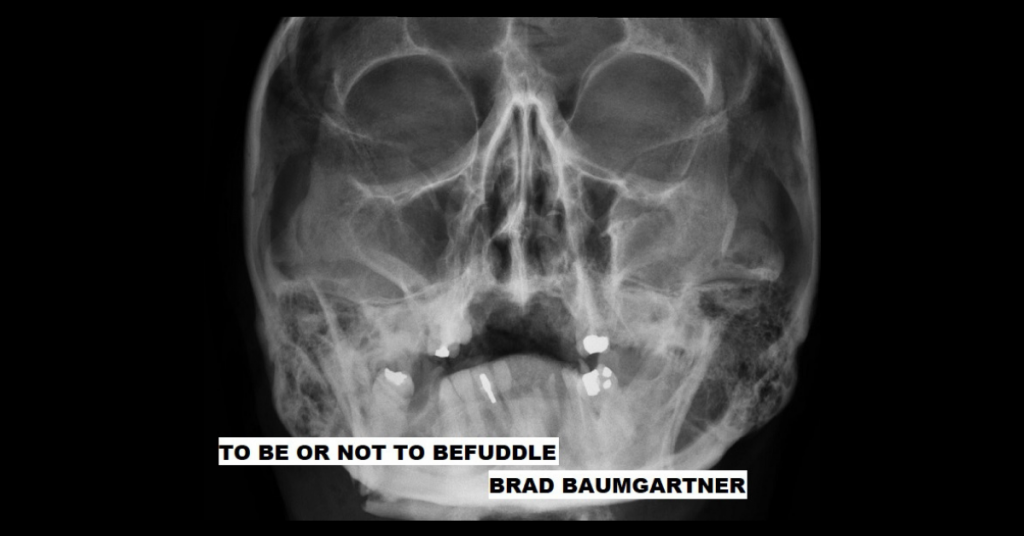Drowned out, like an ant’s ear drums (having not yet “ears to hear” in order to “listen and understand”), as it sits, uncertainly, on a twig placed atop the crevice between a washing machine and a dryer, is our consciousness of Consciousness. The twig is also a razor’s edge, on which the ant balances itself, and in which lurks the seed of the failure of gravity. On one side of the razor’s edge the ant enacts faith upon its future, knowing in full measure that it will not fall if it maintains (via will) the clarity of balance. On the other side of this razor’s edge, however, sits the unknown permeability of caprice, the strange undoing of the twig by the unevent of the opposite of sound, a gone-poof where the ant’s lack of ear drums has nothing at all to do with anything.
This caprice lets loose the will’s nonsensical parody of itself and asks skeptical questions of it pertaining to hidden biological functions, hereditariness, what happens inside a vessel of blood, etc. This nothing at all to do with anything is actually a something, but a sum-Thing that does not require one’s active thinking of it to be anything. Is this something then a nothing? And could it not also be said to be the wyrd relationship an individual might, quite unsuspectingly, that is, ignorantly, have with oneself, as one peers into the tilted mirror of being to see something so bewildering that the experience of this being-fuddled becomes a comico-frightening endeavor, one which promises nullity but secretly vows erasure?
Ultimately, one must balance oneself on this twig, but in such a way as to simultaneously remove the twig’s being-as-precept, to exhort the blurring of the gap between oneself and the world and of the crevice’s acosmic blurring of world and world. Blurring the gap dispels the incisive derision of identity, of the plugging up of the ineffable, of the fear of falling. Make not love with the succubus that indicts and invites the mirror of being’s reflection, but rather with the one that calls it into question.
If one would only realize that one is always already the deaf ant…. that our ear drums resign us to a certain mode of consciousness in which fear itself is the ultimate, illusive sound….
~
The elders in the community often spoke of an old dreadlocked sage who was brought into prison. He never said a word to anyone. But one night, as the sage slept deeply in his room, a guard heard these words being whispered from the sage’s unmoving mouth:
“I know a room, a room you cannot enter. I know this room from the inside-out. It took me a long time to find my way into it, and now that I’m there, I wish not to leave. It is so cozy; at once intimate, comfortable, and yet large enough to fill a universe. But just as you see this room from the outside-in, not yet able to walk in, I have a restraint as well. I cannot open the door to the outside. That door must be opened by one who has found the key. Until then, I will keep the windows clean, so that an onlooker’s gaze can view the inside of this beautiful room. At this time of year, the windows will surely be dirtied by sandstorms. But they must. What else can a window be other than itself, an eternal passageway that, like Janus, looks inward and outward at the same time, beckoning the senses to become what they were meant to be, instruments of divinity.”
The guard continued his service until one day, long after the old sage had passed away, he earned his retirement papers. The people in his community were surprised when he opened up a small shop fixing windows. It is said that he charged no one for his services.
~
As a young man, the old dreadlocked sage once came across an unsightly Thing in the woods. The Thing whispered to him:
“Have you ever known that all of your words are completely useless if you cannot attribute to them the non-experience of a divinity so vast that its own incommunicability becomes its manner of suspension (of dis-belief), where the love of its lostness and the lostness of its love combine to form one ubiquitous, auto-flagellating Word, the Word, the One to which your lofty unborn gaze draws itself. This cataclysm of utility marks your dereliction from the divine, that ontological slaughterhouse in which you place your trust, confining you to the horizon where cosmic thought is banished by your own reptilian nature.
Think about this, and then swiftly forget it: non-thinking is the only way out of this reprehensible hologram of yourself. The world is purely world until it becomes other than itself, just as you are merely you until you are other than yourself, which is to say, not you and not-not you, but rather what is you when the is is not. You are dwarfed by your own incomprehensibility. Step outside, which is really inside, and then reverse the outside to be inside and the inside to be outside. This Outside-Inside is the negativity of the All, and once you reverse the reversal you may be granted entrance into the eternal darkness that is your shimmering light.”
The old man never told the Thing that he was in fact deaf, and just nodded. Though one day, many years later, after many trials and tribulations, he watched himself (as if from atop a hill) pass his younger self on the street. The man stared, bewildered. His younger self winked, mutely mouthed hello to him, and walked off into the sun-lit city. At that moment, the old man heard and understood exactly what the Thing had told him.

